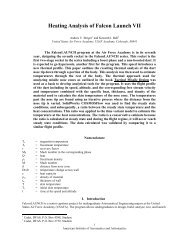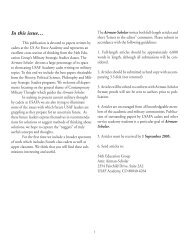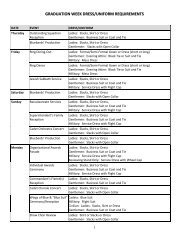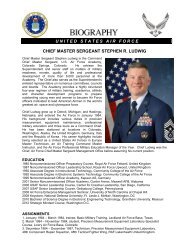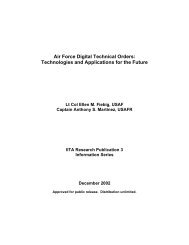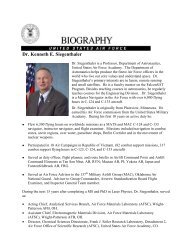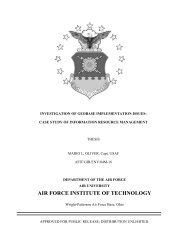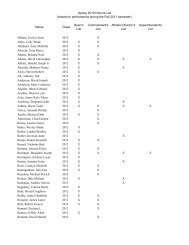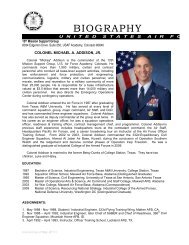the rollback of south africa's biological warfare program
the rollback of south africa's biological warfare program
the rollback of south africa's biological warfare program
You also want an ePaper? Increase the reach of your titles
YUMPU automatically turns print PDFs into web optimized ePapers that Google loves.
and <strong>of</strong>fensive nature <strong>of</strong> Project Coast.<br />
According to General (ret.) Meiring, <strong>the</strong> CBW <strong>program</strong> was still needed<br />
after 1990, due to problems <strong>of</strong> crowd control and <strong>the</strong> possibility that <strong>the</strong><br />
ANC/MK had CBW. 123 At <strong>the</strong> same time, once de Klerk decided to roll back<br />
Project Coast, <strong>the</strong> process was time-consuming due to <strong>the</strong> sophistication <strong>of</strong> <strong>the</strong><br />
<strong>program</strong>. Scientists and researchers had to be laid <strong>of</strong>f over a period <strong>of</strong> time.<br />
Also, South Africa did not want to attract attention. According to Pierre Steyn,<br />
former Secretary <strong>of</strong> Defense, ano<strong>the</strong>r major impediment to dismantlement was<br />
<strong>the</strong> bloated military that had developed throughout <strong>the</strong> 1980s. This meant that<br />
by <strong>the</strong> early 1990s <strong>the</strong> government faced a "situation <strong>of</strong> insubordination in <strong>the</strong><br />
military by 1992.” 124 In response to de Klerk’s order, intelligence procedures<br />
were restructured and personnel changes were made but police investigations<br />
were never able to flush out all <strong>the</strong> details <strong>of</strong> what was happening. Throughout<br />
<strong>the</strong> military, <strong>the</strong>re was stonewalling.<br />
Proliferation and Counterproliferation<br />
At <strong>the</strong> beginning <strong>of</strong> 1990, <strong>the</strong> U.S., backed by Britain and Israel, issued a<br />
strongly worded “hostile nation warning” on rolling back <strong>the</strong> South African<br />
nuclear weapons <strong>program</strong>. 125 With <strong>the</strong> prospect <strong>of</strong> <strong>the</strong> ANC taking power, <strong>the</strong><br />
U.S., <strong>the</strong> UK and Israel did not want to see <strong>the</strong> <strong>program</strong>’s assets or secrets<br />
being sold to adversaries in <strong>the</strong> Middle East or elsewhere. De Klerk was<br />
persuaded by <strong>the</strong> ultimatum, especially as he saw no future need for nuclear<br />
weapons. In addition, South African <strong>of</strong>ficials were being forced by <strong>the</strong> U.S. to<br />
take a stand on <strong>the</strong> Non-Proliferation Treaty (NPT), in time for <strong>the</strong> June 1990<br />
NPT review conference. According to Pr<strong>of</strong>. Andre Buys, 126 in early 1990, de<br />
Klerk decided to end <strong>the</strong> nuclear <strong>program</strong>. It took three years (1990-93) to<br />
dismantle. Documentation, diskettes and hard drives were destroyed. De Klerk<br />
appointed Pr<strong>of</strong>. Mouton as <strong>the</strong> auditor to supervise <strong>the</strong> disarmament process.<br />
From 1990-93, “Operation Masada” was carried out by <strong>the</strong> government and<br />
involved shredding <strong>of</strong> document and destroying <strong>of</strong> hard drives relating to <strong>the</strong><br />
46




